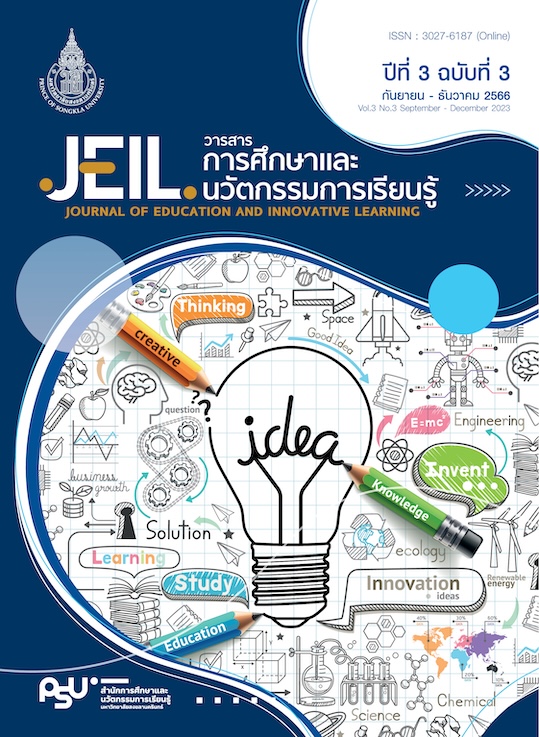คุณลักษณะ องค์ประกอบ และแนวทางการพัฒนาภาวะผู้นำการเปลี่ยนแปลงเพื่อสร้างองค์กรแห่งนวัตกรรมทางการศึกษาของผู้บริหารวิทยาลัยพยาบาลในประเทศไทย
Main Article Content
บทคัดย่อ
การวิจัยนี้มีวัตถุประสงค์เพื่อศึกษาคุณลักษณะ องค์ประกอบ และนำเสนอแนวทางการพัฒนาภาวะผู้นำการเปลี่ยนแปลงเพื่อสร้างองค์กรแห่งนวัตกรรมทางการศึกษาของผู้บริหารวิทยาลัยพยาบาลในประเทศไทย โดยใช้ระเบียบวิธีวิจัยแบบผสานวิธี กลุ่มตัวอย่าง ได้แก่ บุคลากรสังกัดวิทยาลัยพยาบาล 5 สถาบัน ประกอบด้วย ผู้บริหาร จำนวน 25 คน คณาจารย์และเจ้าหน้าที่ จำนวน 564 คน รวมทั้งสิ้น 589 คน โดยใช้การสุ่มตัวอย่างแบบหลายขั้นตอน เครื่องมือที่ใช้ในการวิจัย ได้แก่ แบบสอบถาม แบบสัมภาษณ์เชิงลึก และแบบสนทนากลุ่ม จากนั้นทำการวิเคราะห์องค์ประกอบเชิงสำรวจ การตรวจสอบด้วยวิธีวิทยาวิจัยสามเส้าด้านข้อมูล และการยืนยันร่างแนวทางโดยวิธีการสนทนาอิงผู้เชี่ยวชาญ ผลการวิจัยพบว่า คุณลักษณะของผู้นำการเปลี่ยนแปลงประกอบด้วยคุณลักษณะส่วนตัว การพัฒนางานเพื่อมุ่งสู่ความเป็นเลิศ การพัฒนาบุคลากรและการปรับตัววิถีใหม่ และประกอบด้วย 8 องค์ประกอบ สำหรับแนวทางการพัฒนาภาวะผู้นำการเปลี่ยนแปลงเพื่อสร้างองค์กรแห่งนวัตกรรมทางการศึกษาของผู้บริหารวิทยาลัยพยาบาลในประเทศไทยมี 8 องค์ประกอบหลัก วิธีการพัฒนาสามารถทำได้ 5 วิธี ได้แก่ (1) การเรียนรู้และพัฒนาด้วยตนเอง (2) การเรียนรู้ผ่านระบบออนไลน์ (3) การใช้กรณีศึกษา (4) การเรียนรู้ผ่านเอไอ และ (5) การฝึกอบรมเชิงปฏิบัติการ ส่วนกระบวนการการพัฒนาที่เหมาะสมโดยใช้ PIERI ได้แก่ (1) การวางแผน (2) การนำไปปฏิบัติ (3) การประเมินผล (4) การสะท้อนผล และ (5) การปรับปรุง โดยการกำหนดเป็นนโยบายและแผนงานประจำปีเพื่อการพัฒนาผู้บริหารให้มีสมรรถนะสูงขึ้น ผลการวิจัยสามารถนำไปใช้ในการพัฒนาภาวะผู้นำการเปลี่ยนแปลงของผู้บริหารสำหรับการผลิตบัณฑิตวิชาชีพการพยาบาลให้มีคุณภาพต่อไป
Article Details

อนุญาตภายใต้เงื่อนไข Creative Commons Attribution-NonCommercial-NoDerivatives 4.0 International License.
เนื้อหาและข้อมูลในบทความที่ตีพิมพ์ในวารสารการศึกษาและนวัตกรรมการเรียนรู้ ถือเป็นข้อคิดเห็นและความรับผิดชอบของผู้เขียน ซึ่งกองบรรณาธิการวารสาร ไม่จำเป็นต้องเห็นด้วยหรือร่วมรับผิดชอบใด ๆ และไม่สงวนสิทธิ์การคัดลอกบทความเพื่อใช้ประโยชน์ทางวิชาการ แต่ให้อ้างอิงข้อมูลแสดงที่มาของบทความทุกครั้งที่นำไปใช้ประโยชน์
เอกสารอ้างอิง
Chen, S. C., & Shao, J. (2022). Feminine traits improve transformational leadership advantage: investigation of leaders’ gender traits, sex and their joint impacts on employee contextual performance. Gender in Management: An International Journal, 37(5), 569-586. doi:10.1108/GM-06-2020-0167
Da'as, R., Watted, A., & Barak, M. (2020). Teacher's withdrawal behavior: examining the impact of principals' innovative behavior and climate of organizational learning. International Journal of Educational Management, 34(8), 1339-1355. doi:10.1108/IJEM-12-2019-0449
Gil, A. J., Rodrigo-Moya, B., & Morcillo-Bellido, J. (2018). The effect of leadership in the development of innovation capacity: a learning organization perspective. Leadership & Organization Development Journal, 39(6), 694-711. doi:10.1108/LODJ-12-2017-0399
Juyumaya, J., & Torres, J. P. (2023). Effects of transformational leadership and work engagement on managers’ creative performance. Baltic Journal of Management, 18(1), 34-53. doi:10.1108/BJM-11-2021-0449
Mykhailyshyn, H., Kondur, O., & Serman, L. (2018). Innovation of education and educational innovations in conditions of modern higher education institution. Journal of Vasyl Stefanyk Precarpathian National University, 5(1), 9-16.
Pattnaik, S. C., & Sahoo, R. (2021). Transformational Leadership and Organizational Citizenship Behaviour: the Role of Job Autonomy and Supportive Management. Management Research Review, 44(10), 1409-1426. doi:10.1108/MRR-06-2020-0371
Phakamach, P., Phomdee, R., & Wachirawongpaisarn, S. (2021). The educational innovative organization in the digital era model for higher education management under new normal situations in Thailand. Proceedings of Research Administration Network Conference 2021, 349-363. [in Thai]
Phakamach, P., Senarith, P., & Wachirawongpaisarn, S. (2022a). ICT systems development guidelines for educational innovation management of Rajamangala University of Technology in Thailand. Journal of Education and Innovative Learning, 2(2), 109-130. [in Thai]
Phakamach, P., Senarith, P., & Wachirawongpaisarn, S. (2022b). The metaverse in education: the future of immersive teaching & learning. RICE Journal of Creative Entrepreneurship and Management, 3(2), 75-88.
Phakamach, P., Senarith, P., Dolprasit, S., Brahmawong, C., Panjaratanakorn, D., Chaisakulkiet, U., Pholsward, R., & Wachirawongpaisarn, S. (2023). Digital leadership development model for science school administrators in Thailand. RICE Journal of Creative Entrepreneurship and Management, 4(1), 14-26. doi:10.14456/rjcm.2023.2
Samad, A., Muchiri, M., & Shahid, S. (2022). Investigating leadership and employee well-being in higher education. Personnel Review, 51(1), 57-76. doi:10.1108/PR-05-2020-0340
Soewarno, N., & Tjahjadi, B. (2020). Mediating effect of strategy on competitive pressure, stakeholder pressure and strategic performance management (SPM): Evidence from HEIs in Indonesia. Benchmarking: An International Journal, 27(6), 1743-1764. doi:10.1108/BIJ-06-2019-0292
Supermane, S. (2019). Transformational leadership and innovation in teaching and learning activities: the mediation effect of knowledge management. Information Discovery and Delivery, 47(4), 242-250. doi:10.1108/IDD-05-2019-0040
Xie, L. (2020). The impact of servant leadership and transformational leadership on learning organization: a comparative analysis. Leadership & Organization Development Journal, 41(2), 220-236. doi:10.1108/LODJ-04-2019-0148


